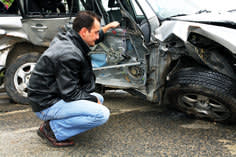What Not to Do After a Car Accident
July 5, 2013
 There are many potential missteps after you have been involved in an auto accident. In the minutes, hours and days following a car wreck, it can be difficult to think clearly or to take note of important factors involving liability and compensation. Even if your injuries are minor and your vehicle is not damaged, you should follow these guidelines to protect yourself and preserve your right to compensation for your injuries, vehicle damage or lost income. Often times, your damages are more serious than they appear at first glance.
There are many potential missteps after you have been involved in an auto accident. In the minutes, hours and days following a car wreck, it can be difficult to think clearly or to take note of important factors involving liability and compensation. Even if your injuries are minor and your vehicle is not damaged, you should follow these guidelines to protect yourself and preserve your right to compensation for your injuries, vehicle damage or lost income. Often times, your damages are more serious than they appear at first glance.
Don’t Apologize
Even if you think you are clearly at fault for the accident, don’t accept blame or apologize to anyone. The police and insurance adjusters will investigate the collision and determine where the fault lies. If it lies with you, you will most certainly be notified. But affirming your guilt before all the facts are discovered can only serve to undermine your personal injury claim or a potential defense if you are on the receiving end of a lawsuit.
Don’t Compare Notes
Avoid rehashing the accident with the other involved parties. You do not want to inadvertently admit fault for the accident, or make other statements that undermine a future legal claim. Additionally, swapping stories can cause confusion in your own mind regarding what happened immediately before and during the collision. Of course, you should give your statement to the police, if applicable. But further communications regarding the accident, your injuries, damage to your vehicle, or associated expenses for medical treatment or car repairs should be limited to your attorney.
Don’t Get into a Dispute with Other Drivers or Passengers
Tempers can sometimes flare. People may be hurt, property may be damaged. Nobody is getting to their destination, and everyone may be concerned regarding various obligations and future travel arrangements. If other parties become upset, agitated or violent, you should simply walk away. By refusing to engage in emotional dialogue – or worse, a physical confrontation – you avoid turning a routine fender bender into a major altercation which can result in its own legal ramifications.
Don’t Call the Insurance Company
If you think there is any reason why the insurance company may dispute your claim, you should speak with an attorney first. The attorney can advise you regarding what to say – and what not to say – to the insurance adjuster, or can communicate with the adjuster on your behalf. Insurance companies train their adjusters to ask specific questions designed to make your case look as weak as possible. Your insurance company should help you when you’ve been involved in an accident – that’s part of what you pay for – but ultimately the bottom line is of primary importance. The insurance business is far more profitable when the insurance companies do not have to pay out claims.
